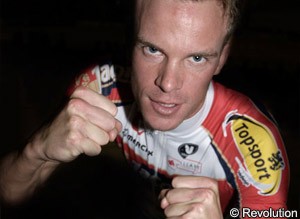Complex saga continues with rider now able to race abroad but not at home
 Belgian rider Iljo Keisse (Quick Step) has lost the latest round in what is a complicated battle over a positive test three years ago, with the Brussels Court of First Instance ruling today that the rider remains banned in his home country.
Belgian rider Iljo Keisse (Quick Step) has lost the latest round in what is a complicated battle over a positive test three years ago, with the Brussels Court of First Instance ruling today that the rider remains banned in his home country.
Keisse tested positive for cathine and hydrochlorothiazide (HCT) after winning the Six Days of Gent in November 2008, and was given a two year ban. Keisse successfully argued last year in a Belgian court that a worldwide ban by the Court of Arbitration for Sport didn’t apply in his home country, enabling him to race there despite being suspended elsewhere.
This ruling was overturned in May by the Brussels Court of Appeal; Keisse then took the case before the Court of First Instance, but today it declared itself not competent in the matter. The ruling means that he remains blocked from racing in Belgium. He has indicated that he is likely to appeal.
The UCI told VeloNation today that the outcome was big news for sport. “We have learned of the ruling today, which is that the Belgian court [the Court of First Instance – ed.] which allowed him race doesn’t have jurisdiction in this matter,” said UCI press officer Enrico Carpani. “This case is of big importance, not just for cycling, but for sport in general. It happens quite often now that people lodge an appeal in the civil court to fight against sporting judgement, but this ruling shows that CAS is the only one considered to have jurisdiction.”
Keisse was initially suspended for two years, but was cleared at the beginning of November 2009 by the disciplinary committee of the Belgian Cycling Federation. This decision was appealed by the UCI to CAS, which upheld the original suspension. As Keisse had already served eleven months, a return date was set for August 6th this year.
The case became more complicated last November when Keisse took a case to the Belgian Court of Appeal in order to try to gain the right to start his hometown race, the Gent Six Day. It ruled against the CAS decision, giving him a green light to race in Belgium.
This decision was overturned in May when the Brussels Court of Appeal upheld the original CAS judgement to suspend him.
While his worldwide ban expired in early August, the fact that he had been racing on home soil prior to May meant that he is not able to compete in Belgium until January 28th of next year. Keisse was trying to overturn this so that he could compete in the Gent Six Day and other events.
Carpani said that today’s court decision vindicated the UCI. “For us, I would say this ruling is important for a very practical reason as after this judgement, we are now much more comfortable with the case,” he told VeloNation. “We know once again that our proceedings were correct and we were on the right side of the problem.”
Today’s ruling will likely have implications in future cases in Belgium. Outside those borders, Carpani concedes that riders in other countries may try to use the local courts as Keisse did. However he believes that today’s ruling sends out a signal, and that other countries may well rule in the same way in similar cases.
Keisse and compatriot Kenny De Ketele won the European Madison championship in Apeldoorn on Sunday, just hours after the Belgian won the Amsterdam Six Day with Dutch rider Niki Terpstra.
He can continue racing abroad but today’s ruling means that he will miss the Gent Six Day, to be held from November 22nd to 27th this year, plus any other Belgian events.
The 28 year old has already learned that his contract with Quick Step will not be renewed for 2012.
The substance Hydrochlorothiazide is the same as that which Alexandr Kolobnev tested positive for during this year’s Tour de France. He had a long-overdue hearing in Moscow yesterday, with initial reports suggesting that he would only be given a warning and a 1,500 Swiss franc fine. Official confirmation of that is yet to be given.